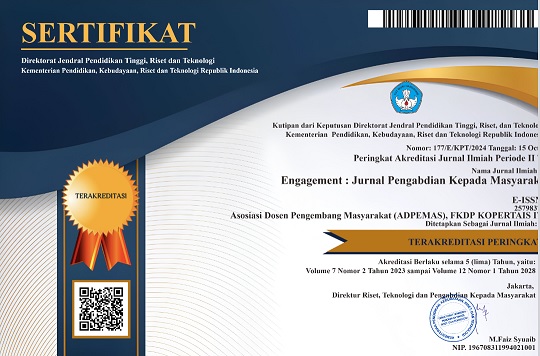The Relevance Between Z Generation Lifestyle and Working Model of Startup Business in Information Technology Field
Abstract
The purpose of this soft skill seminar in class XII is to foster enthusiasm in improving soft skills and hard skills which will later be used in finding job opportunities, as well as providing an understanding of the work model of startup companies that are very related to the lifestyle of Generation Z. The method used is an educational method by way of fill in seminars to provide an overview of startup companies that are currently developing, as well as provide perspectives on students who will face graduation so that they remain optimistic in finding job opportunities at startups whose work models are related to the generation Z lifestyle. With the similarities between the Gen Z lifestyles With the startup king model, in terms of work, it will be better and will provide excellent career opportunities for Generation Z.
Downloads
References
AJMAIN, TALHAH. “Impacts and Effective Communication on Generation Z in Industrial Revolution 4.0 Era.” JETAL: Journal of English Teaching & Applied Linguistic 2, no. 1 (2020): 37–42.
Bali, Politeknik Negeri. “KAJIAN PENGARUH APLIKASI STARTUP TERHADAP PELUANG KERJA DI ERA PELUANG KERJA DI ERA INDUSTRI 4 . 0 I Gede Suputra Widharma & Team I,” no. October (2020).
Christiani, Lintang Citra, and Prinisia Nurul Ikasari. “Generasi Z Dan Pemeliharaan Relasi Antar Generasi Dalam Perspektif Budaya Jawa.” Jurnal Komunikasi dan Kajian Media 4, no. 2 (2020): 84–105.
Clara Wijaya Rosa, Meita, Eko Ganis Sukoharsono, and Erwin Saraswati. “The Role of Venture Capital on Start-up Business Development in Indonesia.” Journal of Accounting and Investment 20, no. 1 (2019).
Ecology, Subtropical, and Rural Affairs. “A BUSINESS MODEL TO SUPPORT SUSTAINABLE PERFORMANCE OF DIGITAL STARTUP COMPANIES,” no. 74 (2019): 140–147.
Hadi Ryandono, Muhamad Nafik. “Fintech Waqaf: Solusi Permodalan Perusahaan Startup Wirausaha Muda.” Jurnal Studi Pemuda 7, no. 2 (2019): 111.
Hardiansyah, Rudi, and Dodie Tricahyono. “Identifikasi Faktor-Faktor Kesuksesan Start Up Digital Di Kota Bandung.” Jurnal Ekonomi 27, no. 2 (2019): 134–145.
Hastalona, Dina, and Atma Jonar Asih. “PKM PENTINGNYA PENGUASAAN SOFT SKILL BAGI GENERASI Z DI KALANGAN SISWA-SISWI SMA INTI NUSANTARA TEBING” 1, no. 4 (2021): 162–167.
Igamo, Alghifari Mahdi, Agung Raneo Putra, Nur Khamisah, and Arika Kurniawan. “Business Environment and Start-Up in Indonesia:Empirical Evidence from Province-Level Data.” Journal of Economic Development, Environment and People 9, no. 4 (2020): 38–49.
Industri, Revolusi, Studi Kasus, Perguruan Tinggi, and D I Makassar. “KOMPETENSI GENERASI Z DALAM MENGHADAPI ERA” 3, no. 3 (2020): 184–200.
Kurniawati, Endah, and Catur Sugiyanto. “Pengaruh Struktur Umur Penduduk Terhadap Pertumbuhan Ekonomi Di Indonesia.” Jurnal Ekonomi dan Pembangunan Indonesia 21, no. Januari (2021): 41–58.
Kwiatkowski, Cezary. “Characteristics of the Start-up Culture from the Perspective of the Organizational Culture Model.” Czech Journal of Social Sciences, Business and Economics 5, no. 3 (2016): 28–36.
Lase, Delipiter, and Dorkas Orienti Daeli. “Pembelajaran Antargenerasi Untuk Masyarakat Berkelanjutan: Sebuah Kajian Literatur Dan Implikasi.” Jurnal Ilmiah Ilmu Sosial 6, no. 2 (2020): 89.
Ministry of Finance Republic of Indonesia., Asian Development Bank. Innovate Indonesia Unlocking, 2020.
Nugroho, Rully Adi, Sri Kasmiyati, Elizabeth Betty Elok Kristiani, Vincentia Irene Meitiniarti, and Agna Sulis Krave. “Using a Participatory Learning and Action Approach to Improve Young Papuans and Moluccans’ Knowledge of Herbal Drinks to Increase Immunity During the COVID-19 Pandemic.” Engagement: Jurnal Pengabdian Kepada Masyarakat 5, no. 2 (2021): 297–311.
Nur Habibah, Siti Rahmawati, and Andita Sayekti. “Pengaruh Gaya Belajar Terhadap Prestasi Mahasiswa Generasi Z Di Perguruan Tinggi.” Perspektif Ilmu Pendidikan 33, no. 2 (2019): 7–18.
Nurcahyo, Rahmat, Mohammad Ilhamsyah Akbar, and Djoko Sihono Gabriel. “Characteristics of Startup Company and Its Strategy: Analysis of Indonesia Fashion Startup Companies.” International Journal of Engineering and Technology(UAE) 7, no. 2 (2018): 44–47.
Pratama, Dian, Program Studi Manajemen, Universitas Pamulang, Program Studi Manajemen, Universitas Pamulang, and Generasi Millineal. “Available Online at : Http://Openjournal.Unpam.Ac.Id/Index.Php/PSM/Index STRATEGI PENGEMBANGAN KUALITAS SDM ‘ GENERASI MILLENIAL & GENERASI Z ’ DALAM MENGHADAPI PERSAINGAN,” no. November (2021): 19–21.
Putri, D.Ch., I. Fahmi, and A.I. Suroso. “Factors Affecting Investor Decisions To Invest in Startup: A Case Study of Startup Xyz.” Russian Journal of Agricultural and Socio-Economic Sciences 89, no. 5 (2019): 217–226.
Rahmadiane, Ghea Dwi, Bahri Kamal, Arief Zul Fauzi, and Asrofi Langgeng Noermansyah. “Pengembangan Bisnis Startup Untuk Meminimalisir Kegagalan Dalam Berbisnis.” Jurnal Vokasi - Politeknik Negeri Lhokseumawe 4, no. 2 (2020): 46.
S.A.P., Rangga Sa’adillah. “Education and Mentoring About Cyberbullying Through Law of Information and Electronic Transaction and Islamic Teaching to ‘Generation Z.’” Engagement: Jurnal Pengabdian Kepada Masyarakat 5, no. 2 (2021): 397–412.
Sakitri, Galih. “‘ Selamat Datang Gen Z , Sang Penggerak Inovasi ! ’” 1995, no. 2018 (2020): 1–10.
Septiandika, Verto, Mariatul Khiptia, and Agis Aderovi. “EFEKTIVITAS PROGRAM SENSUS PENDUDUK KABUPATEN PROBOLINGGO SECARA ONLINE DI MASA PANDEMI COVID-19 TAHUN 2020” 3, no. 2 (2021).
Suwarni, Rinto Noviantoro, Mochammad Fahlevi, and Muhammad Nur Abdi. “Startup Valuation by Venture Capitalists: An Empirical Study Indonesia Firms.” International Journal of Control and Automation 13, no. 2 (2020): 785–796.
W, R Willya Achmad, Marcelino Vincentius Poluakan, Didin Dikayuana, Herry Wibowo, and Santoso Tri Raharjo. “Potret Generasi Milenial Pada Era Revolusi Industri 4.0.” Focus : Jurnal Pekerjaan Sosial 2, no. 2 (2020): 187.
Zulkarnain, Wendy, and Sheila Andini. “Inkubator Bisnis Modern Berbasis I-Learning Untuk Menciptakan Kreativitas Startup Di Indonesia.” ADI Pengabdian Kepada Masyarakat 1, no. 1 (2021): 77–86.
Copyright (c) 2022 Engagement: Jurnal Pengabdian Kepada Masyarakat

This work is licensed under a Creative Commons Attribution-ShareAlike 4.0 International License.







_-_Copy1.jpg)
